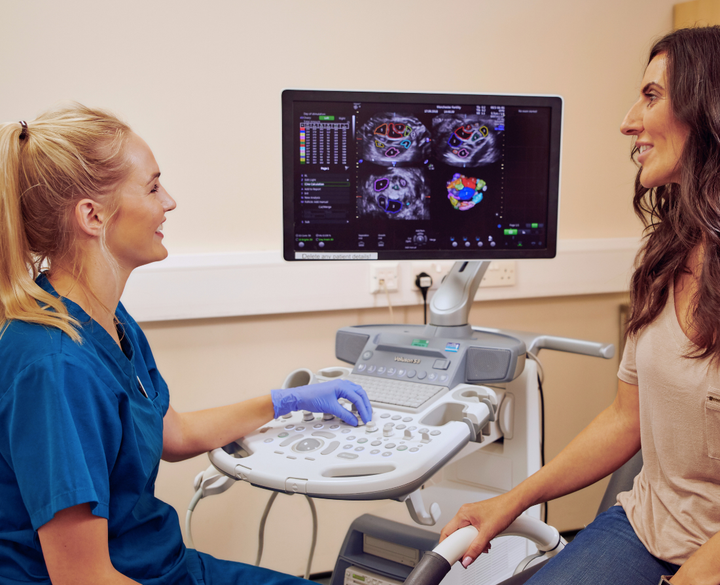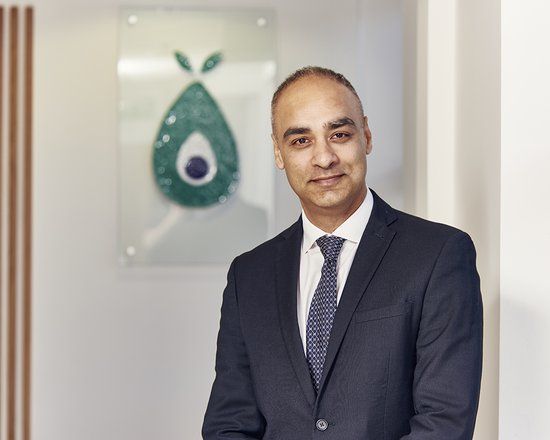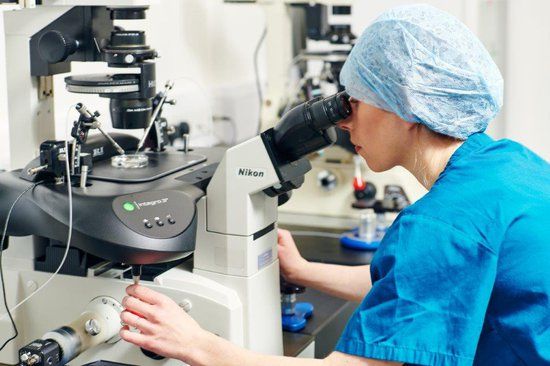
PCOS (Polycystic Ovary Syndrome) is a hormonal condition that affects around 1 in 10 women in the UK and is a common reason why people visit our clinic.
We’ve created this guide to help you understand the condition, explore its impact on fertility and discover the treatment options available to help give you the best chance of starting a family.
What is PCOS?
PCOS is a condition that causes an imbalance in your reproductive hormones, which can influence how your ovaries function. With PCOS, the ovaries produce an abnormal number of male sex hormones called androgens, which are usually only found in small quantities in women. This hormone imbalance can cause tiny cysts to grow on or in the ovaries.
What are the symptoms of PCOS?
Symptoms can vary significantly from person to person, but may include:
- Irregular or absent periods
- Difficulty getting pregnant
- Excess hair growth
- Oily skin
- Mood changes
Does PCOS affect fertility?
As PCOS causes a hormonal imbalance, eggs may fail to mature or be released as they should, meaning women with PCOS may not ovulate regularly or even at all. This causes irregular ovulation patterns, which can make it more difficult to conceive.
Do I need fertility treatment if I have PCOS?
Having PCOS doesn’t necessarily mean you won’t be able to conceive naturally, it just might take a bit longer than expected.
For some women, making lifestyle changes such as achieving a healthy BMI, keeping track of ovulation cycles, or using at-home ovulation kits can improve chances of pregnancy.
However, some women will need the help of fertility treatment to conceive. This all depends on the extent of your condition and how it influences your reproductive and general health.
How are PCOS patients assessed for fertility treatment?
At Manchester Fertility, we specialise in providing personalised fertility treatment. Our doctors understand that PCOS affects women in different ways, so your treatment plan will be tailored to meet your specific needs.
We will start by performing a pelvic ultrasound examination to assess your reproductive health. During this examination, we aim to understand how your body might respond to ovarian stimulation. This is part of our initial assessments, which can also include an AMH blood test, a general health check and investigation of your family medical history.
Our team will use your results to recommend treatment that would work best for you, or the level of fertility hormones you might need. Together we can decide on the best treatment plan for you.
Personalised treatment is crucial for women with PCOS due to the increased risk of Ovarian Hyperstimulation Syndrome (OHSS), which can happen when the ovaries over-respond to fertility medications and produce too many mature eggs.
Before starting treatment, our doctors may recommend lifestyle changes to give the best chance of success in treatment. These recommendations could be things such as taking prenatal vitamins, reducing alcohol consumption or maintaining a healthy BMI.
We have fertility consultants who specialise in treating PCOS and will support you throughout.
What fertility treatments can help with PCOS?
Because PCOS affects every woman differently, the treatment you’re offered will be tailored to best suit you.
Fertility treatments include:
IVF: Depending on your age and severity of PCOS affects you, IVF may be recommended. Your eggs will be fertilised in our laboratory by your partner’s or donor’s sperm. The best quality embryo is then transferred back into your uterus to implant for pregnancy.
If sperm quality is impacting fertilisation, we can use a treatment called ICSI, where one healthy sperm is carefully injected into the egg to support fertilisation.
Induction of ovulation:This treatment uses tailored doses of fertility medication to stimulate your ovaries to produce and release a mature egg. We’ll identify ovulation through blood tests and scans; you can then either try to conceive naturally, or through intrauterine insemination at our clinic.
Meet our experts
Manchester Fertility is home to a team of leading doctors who specialise in PCOS and can guide patients experiencing this condition. You can meet our whole team here or check out some of our individual consultants below:
Dr Raj Mathur
Dr Raj Mathur is our Senior Fertility Consultant. A Consultant Gynaecologist with a long and established career in Reproductive Medicine…read more
Dr Peter Kerecsenyi
Peter joined the Manchester Fertility team in 2009. Over the years, he has gained vast experience by looking after his patients…read more
Dr Anamika Roa
Dr Anamika Rao is our Fertility Consultant with 20 years of experience in Obstetrics, Gynaecology, Infertility and Early pregnancy...read more
Book your free 1-2-1 discovery appointment
If you have PCOS and want to start your family, book a free 1-2-1 discovery appointment with one of our friendly and experienced new patient coordinators to learn more about your options.
Last updated: 20th October 2025





